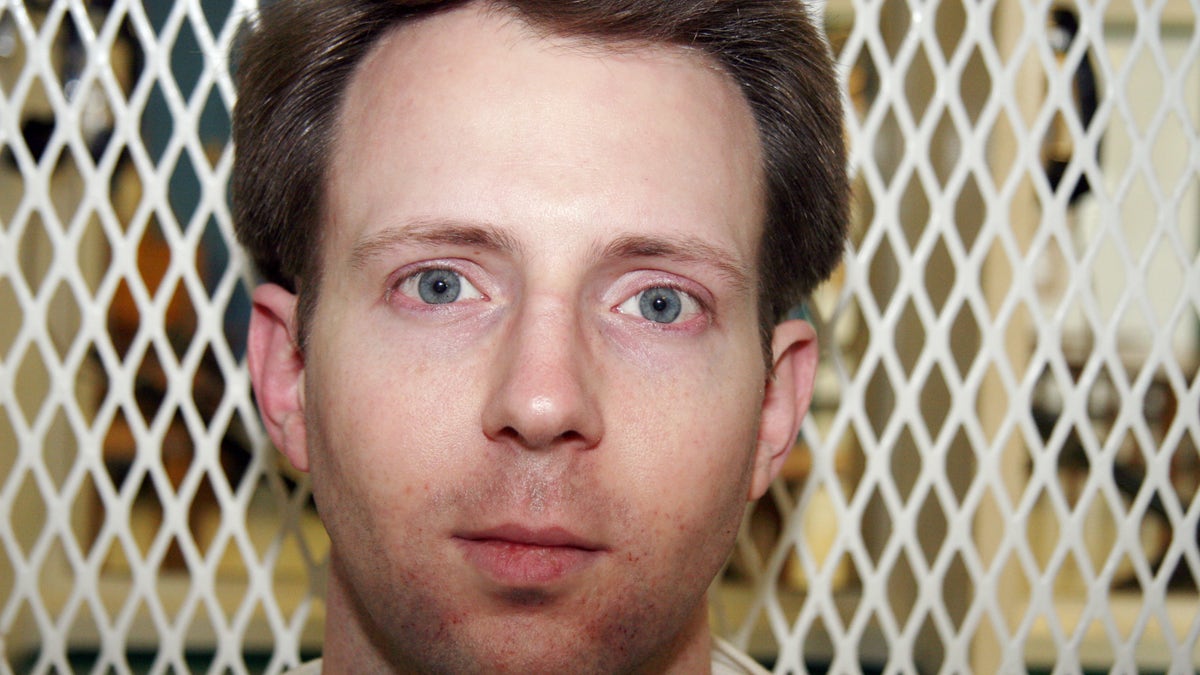
Adam Ward in February. (AP Photo/Michael Graczyk)
The Texas man convicted of killing a city worker in 2005, whose sentence was appealed to and ultimately upheld by U.S. Supreme Court, was executed Tuesday evening.
Adam Ward, 33, received a lethal injection for shooting and killing Michael Walker in Commerce, about 65 miles northeast of Dallas. Walker was a code enforcement officer who had been taking photos of junk piled outside the Ward family home.
Ward insisted the shooting was in self-defense, but the 44-year-old Walker only had a camera and a cellphone.
The execution came after the U.S. Supreme Court rejected an appeal that argued Ward's mental illness, including delusions, should have disqualified him from the death penalty.
Ward's attorneys say he's delusional and should not be put to death because of his mental illness.
Ward insisted he was defending himself when he killed code enforcement officer Michael Walker, who was taking photos of junk piled outside the Ward family home in Commerce, about 65 miles northeast of Dallas.
"Only time any shots were fired on my behalf was when I was matching force with force," Ward told The Associated Press last month from a visiting cage outside death row. "I wish it never happened but it did, and I have to live with what it is."
In a videotaped statement to police following his arrest, Ward said he believed Commerce officials long conspired against him and his father, described in court filings as a hoarder who had been in conflict with the city for years. Evidence showed the Ward family had been cited repeatedly for violating housing and zoning codes.
In their appeal to the high court, Ward's attorneys renewed arguments that he is mentally ill and contended his execution would be unconstitutional because of evolving sentiment against executing the mentally ill.
The justices have ruled that mentally impaired people, generally those with an IQ below 70, may not be executed. However, the court has said mentally ill prisoners may be executed if they understand they are about to be put to death and why they face the punishment.
State attorneys, who said evidence showed Ward's IQ as high as 123, said the late appeal did not raise a new issue, meaning it was improper and without merit. They also disputed claims of changing attitudes about executing the mentally ill.
Evidence of Ward's delusions, paranoia and bipolar disorder was presented at his 2007 trial and resurfaced in earlier unsuccessful appeals. The Supreme Court last October refused to review Ward's case.
"It's frustrating, tormenting, it's depressing," Dick Walker, the father of the man killed, said Monday. "I believe in appeals. I really do. ... It shouldn't drag on for almost 11 years."
Witnesses said Walker was taking photos of the Ward property on June 13, 2005, when he and Ward got into an argument.
Walker told Ward he was calling for assistance. Ward thought that meant police were on their way to kill him, Ward's lead trial attorney, Dennis Davis, said last week.
"Mr. Walker walked into a hornet's nest and didn't know it," Davis said.
Walker made the call and waited near the back of his truck. Ward went inside the house, emerged with a .45-caliber pistol and started firing. Walker was shot nine times.
"I think the only thing he was there for was harassment," Ward said from prison.
Dick Walker, an emergency medical technician when the shooting happened, was the first medic to arrive at the Ward property. He said he "had to intubate my own son on scene to save his life."
He said he's spent years "getting rid of my anger" and in the last year prayed to forgive Ward for the slaying. Still, he believes the punishment is justified.
"I do want him to get the sentence he was given by the jury, and he definitely deserves it," said Dick Walker, who planned to witness Ward's execution.
The Associated Press contributed to this report.

